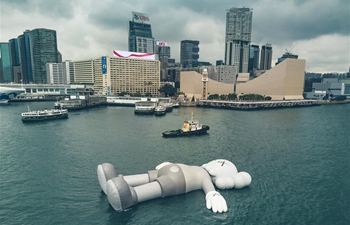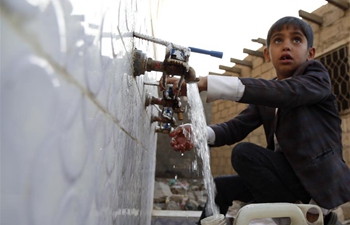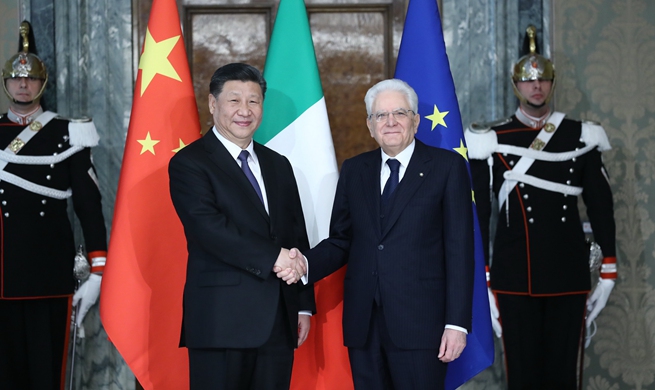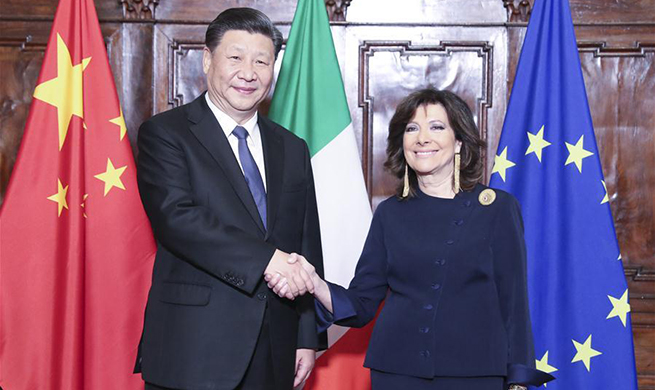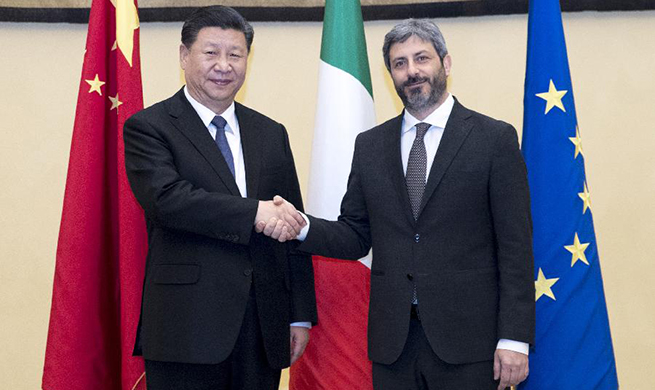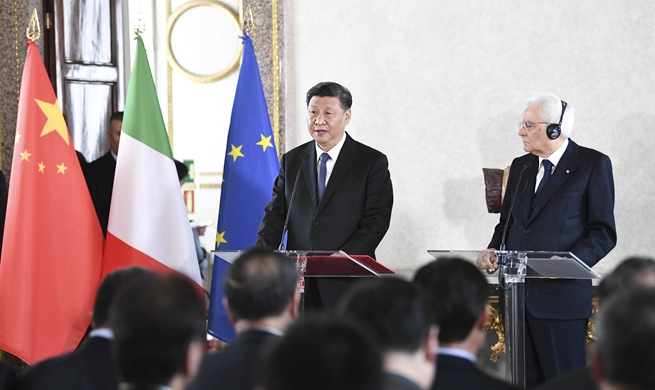by Mohamed al-Azaki
SANAA, March 23 (Xinhua) -- As Yemen is entering the fifth year of civil war this week, the tensions are escalating in the flashpoint port city of Hodeidah with the UN-mediated peace process left high and dry.
The peace deal was reached in Stockholm in December last year, initially seen as a hope to end Yemen's war, but it has since stalled over what the United Nations calls "misinterpretation" of the deal's terms.
Many Yemeni political experts have criticized the deal, saying it lacks vital strategy to be implemented.
"Yemeni people view the deal as the first breakthrough in years, but the deal lacks a crucial mechanism for implementation, which led to many problems when the rival parties try to implement it on the ground," said Mohammed al-Ghobbasi, a political analyst and writer at Al-Thawra Establishment for Journalism and Publishing in the rebel-held capital Sanaa.
"The deal's terms were not expressed in simple or direct ways for people to easily understand. People cannot go to the terms to find out who should be the first to start withdrawing their forces from the city ... It's like a blurry image," he explained.
According to the deal, the redeployment from the ports of Hodeidah, Salif and Ras Issa and critical parts of the city associated with the humanitarian facilities shall be the first step which should be completed within two weeks after the cease-fire enters into force.
Afterwards, the full mutual redeployment of all forces from the city of Hodeidah and the three ports shall be completed within a maximum period of 21 days after the cease-fire enters into force.
The cease-fire deal entered into force on Dec. 18, 2018, while the original deadline for mutual redeployment was Jan. 8, 2019, which was not met.
The UN has since proposed several practical mechanisms through its cease-fire monitor team in Hodeidah to implement the deal, but all efforts have so far ended in failure.
The deal focused on the contested Hodeidah port city and general exchange of prisoners to re-build trust between the government and Houthi rebels as the first step toward a comprehensive political settlement.
Both government and Houthi rebels have agreed to withdraw their forces from Hodeidah, but they dispute over which side would run the city after pullout.
Local political experts suggested that the deal has deepened distrust between the warring parties over the next steps in the peace process.
Abdulmalik al-Jarmozi, a writer and expert of Yemeni armed groups at Al-Jomohoriya Establishment for Journalism in the southwestern province of Taiz, told Xinhua that the warring parties want guarantees to secure their positions in the future political settlement.
"One of the key problems ... is that the deal lacks a direct roadmap toward a final comprehensive political solution ... Many crucial issues are still out of the negotiation table. Many questions exist, such as when and how the transitional national unity government will be formed and about the early parliament and presidential elections," al-Jarmozi said.
"It is the demand of all Yemenis to see and understand the whole picture of the final political solution," he added.
During talks in Stockholm, both the government and Houthi rebels traded accusations of dodging negotiating political issues such as holding early presidential elections. They also blamed each other for avoiding discussing a comprehensive political solution.
Adel al-Assar, an analyst of Al-Thawra Establishment for Journalism and Publishing, said the conflict has expanded beyond Yemen and suggested that regional powers should engage in talks to help shore up Yemen's peace process.
"Regional key players in the Yemeni conflict should also engage in peace talks to guarantee the future political settlement in Yemen," he said.
Saudi Arabia has been leading an Arab military coalition that intervened in Yemen in March 2015 to support the government of President Abd-Rabbu Mansour Hadi after the Houthi rebels forced him into exile and seized much of the country's north, including the capital Sanaa and Hodeidah.
The coalition-backed government troops have been massing on the southern outskirts of Hodeidah since June last year, with military preparations for recapturing the largest Red Sea port city in case peace efforts fail.
The nearly four years of devastating civil war has killed more than 10,000 people, mostly civilians, and displaced 3 million others. The all-out blockade and cut of salaries pushed the entire country to the brink of famine, according to the UN aid agencies.
Hodeidah is the main key port city on the Red Sea. Its port is the main entry of most food and fuel imports to the Yemen's north. Recapturing the city would force the rebels on their knees.
The rebels have lost several large cities and ports in the south after battles against the coalition-backed government forces over the past two years.
Earlier this week, the Houthi rebels threatened to strike Saudi Arabia and the United Arab Emirates with long-range ballistic missiles if the coalition forces pushed into Hodeidah.
Mohammed Ali al-Houthi, head of the rebels' Supreme Revolutionary Committees, said on his Twitter account that his group "does not beat the drums of war but seeks friendly relationships with other countries."
In response, Yemeni Foreign Minister Khaled al-Yamani accused the Houthi group of dodging implementing the deal and urged the UN to reveal which side is breaching the agreement.
On Tuesday, the UN envoy Martin Griffiths said there is "significant progress" toward an agreement to implement the first phase of the agreement on Hodeidah.
"Operational details will be presented to the parties for the Redeployment Coordination Committee (RCC) for endorsement shortly," he said in a statement obtained by Xinhua.
Griffiths said he looks forward to the committee's "swift endorsement of the new plan."





